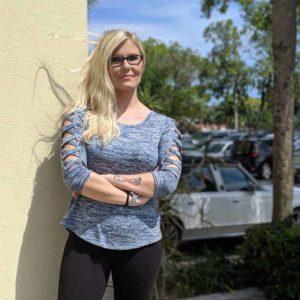Clean Date:May 21, 2016
Age:28
From:Toledo, OH

I started out [using drugs] around 15. It was just typical smoking marijuana and doing cocaine, things along those lines. I had medical issues where I was prescribed a lot of opiates, which later on led me to the heroin use. I lost my grandparents, who basically raised me, six days apart when I was 16. They were my everything. That’s when everything really spiraled out of control. To put being in addiction in words, you have to picture the worst thing that’s ever happened to you in your life and times that by 10. You bring yourself to levels that you never think you’re going to. You have no self worth, don’t see yourself ever becoming anything. I came to recovery after I finally lost custody of all three of my kids. Jail didn’t bring me here. I’d been to treatment several times; didn’t help. The first two, I continued to use after I lost custody, I didn’t care. That’s the depth my addiction brought me to. I had custody of my youngest daughter for the first two years of her life, so I built that bond with her and I didn’t want to lose her. I hadn’t really ever had custody of my other two kids. Children’s services got involved and they told me I was going to lose her. At that point I was stealing from my kids, which is something I had never done. I would do anything to myself, steal from anybody else, rob anyone else, but not them. And that’s when I realized ‘I really need help.’ I really got to see myself and what I had done to my family; and that’s somebody that I never wanted to be. Being in recovery is definitely 100 times better. I can truly say I’m actually happy now. I never really had any idea who I was and I know myself as a person better now. Now is everyday perfect? Absolutely not. But I know I have my tools and resources to utilize, to make sure I don’t have to go back down that road. I’m able to build myself a career and make something of myself, something I never thought was possible before. I’m an admissions manager at Recovery Unplugged. We help people that are struggling to try and get them in here to get the help. We use whatever resources, whether they can come to us or go somewhere else, we make sure that they have somewhere to go. We’re there when they feel like they have no one, and build those relationships. Honestly, my advice to anyone would be that there’s no ‘tomorrow’ anymore. There’s no waiting to get help. [You’re] not alone and don’t have to ever do this alone. I think that’s where the biggest barrier comes in. And if that’s your biggest fear, it shouldn’t be.